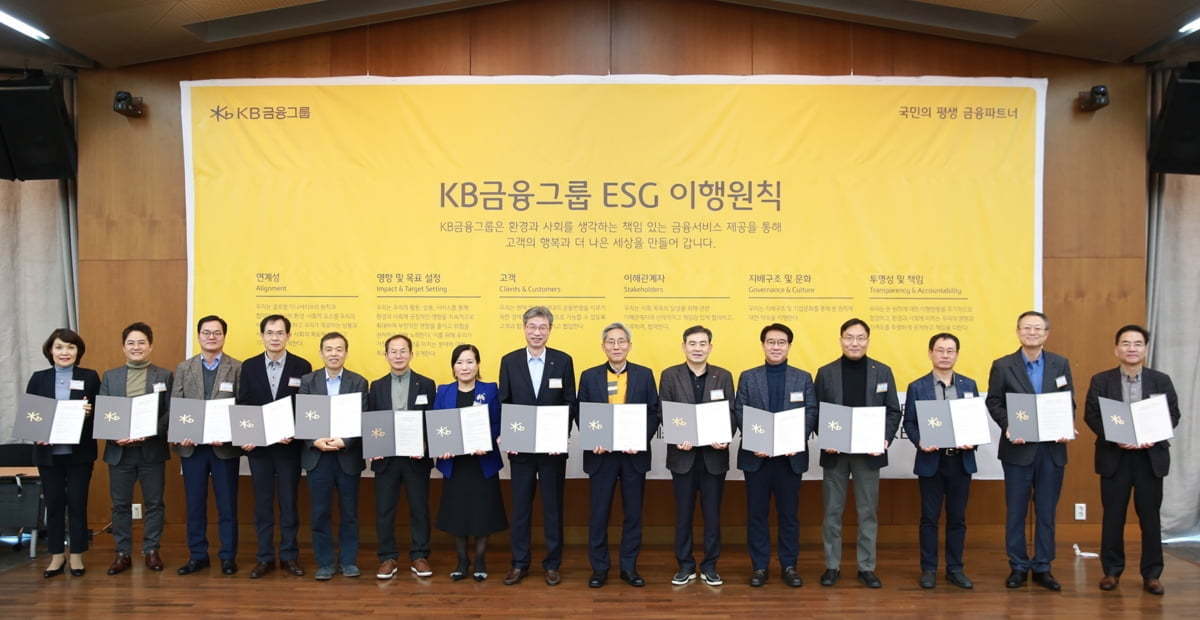Bringing both financial sustainability and transparency have been the focus of South Korean banks amid growing calls around the world for good corporate governance practices and increased predictability in the market.
Companies here -- both financial and nonfinancial -- floated an almost combined $13 billion worth of environmental, social and corporate governance-linked bonds in 2019 alone, nearly double from the previous year’s corresponding figure of $7 billion, according to data provided by a local brokerage.
Such commitments to ESG principles are a focus of attention for Korean banking groups, in particular, at a time when they are undertaking corporate restructuring as part of the government-led reform for transparent and fair markets.
But will such ESG commitments have an impact on the banking sector? Yes, but it is not clear now, say insiders and experts.
At a glance, banks are eager to adopt the ESG practices, saying it is a way to keep in line with international standards and to secure customers’ trust.
KB Financial Group’s flagship commercial lender KB Kookmin Bank -- the first among peers here to issue a ESG-related bond -- is currently reviewing plans to take the ESG data of clients into consideration for corporate lending.
 |
KB Financial Group Chairman Yoon Jong-kyoo (seventh from right) takes a group photo with his employees in front of a board stating ESG values at a New Year’s event held in Yongin, Gyeonggi Province, on Friday. (KB Financial) |
“We plan to take ESG data into consideration for corporate lending because it helps us evaluate the risks associated with our corporate clients,” an official at KB Kookmin Bank told The Korea Herald.
“It’s nothing new really -- global credit rating agencies such as Fitch Group and Moody’s have already adopted ESG elements in their ratings criteria,” the official added.
Bolstered by its new ESG strategy team that was launched Dec. 27 and Chairman Yoon Jong-kyoo’s vows to “swiftly materialize an ESG-based management system,” KB Financial is expected to be actively involved in ESG-related businesses this year. The holding group has been focusing on cultivating its ESG-related products after being included in the Dow Jones Sustainability Index for the fourth consecutive year last year.
KB Financial’s domestic rival Hana Financial Group recently established a social value office, with the aim to better adopt ESG-values to its management.
In his New Year’s address, Hana Financial Chairman Kim Jung-tai said that they now face an era where “not only our shareholders, but every member of our society, including our customers and employees must be satisfied.” He highlighted that every cup of coffee now reflects fair trade and customers who think of the environment.
Shinhan Financial Group included “sustainability” as one of its five pillars or strategic goals for 2020, alongside “fundamental,” “resilience,” “eco-system” and “human talent.”
Though it has yet to carry out restructuring centered around its ESG goals, the group announced a set of principles on Dec. 20 declaring that its values are aligned with the Paris Agreement, a global framework addressing climate change.
The group said it acknowledges climate change as a crucial factor to its management and will establish and carry out relevant measures.
It plans to actively invest in green finance and hire a chief sustainability officer to carry out sustainable and green management more efficiently.
Last year it vowed to invest 20 trillion won ($17.07 billion) in green businesses by 2030 through its strategy dubbed “eco-transformation 2020.”
Like Shinhan, Woori Financial Group has yet to announce a detailed restructuring plan, but has been carrying out a slew of eco-friendly projects that are projected to continue into this year.
Its intra-company campaign of eliminating disposable paper cups and turning off computer monitors has been widely supported by its employees.
Though often overshadowed by green values, gender diversity and equality is an important factor of ESG principles, and Woori Financial recently vowed to expand the pool of its female directors by least 10 percent by 2022.
“We plan to expand our support system for the work-life balance of our female employees,” a Woori Bank official said.
Despite the banking groups’ avid adoption of ESG values, analysts are divided on whether their actions actually mean anything.
“There are still uncertainties surrounding standards for ESG values, including their criteria and deciding on which yardstick the companies should use,” said Lee Si-yeon, an expert at the Korea Institute of Finance.
“Compared with other industries, banks may be relatively more pressured to adopt ESG values due the public nature of their business, but it is unclear whether their goals and standards are completely in sync with the common ESG values. Banks should set separate ESG values that fit their category more clearly because at the moment, it might seem like they’re merely replicating a trend that is popular in other sectors,” she added.
Industry watchers also raised concerns whether the banking groups will stick to their “ESG values” even when dealing with sensitive issues which might entail a large sum of money for compensation.
KEB Hana Bank and Woori Bank are waiting for the authorities’ decision on the extent of penalties regarding compensation to their customers of the derivatives-linked funds fiasco which could possibly undermine their leadership and corporate restructuring efforts. Their misselling of derivatives put their customers at the risk of losing huge sums, prompting calls for improved customer protection, the FSS said after concluding its in-house investigation.
The banks said they would fully abide by the FSS’ recommendations last year to cover up to 80 percent of the losses. However, all eyes are on the fate of Woori Financial Chairman and Woori Bank CEO Sohn Tae-seung and Hana Bank CEO Ji Sung-kyoo as the FSS is reportedly set to reprimand them next week.
By Jung Min-kyung (
mkjung@heraldcorp.com)








![[Herald Interview] How Gopizza got big in India](http://res.heraldm.com/phpwas/restmb_idxmake.php?idx=644&simg=/content/image/2024/11/20/20241120050057_0.jpg)